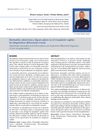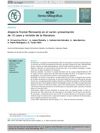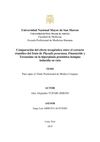 February 2025 in “Journal of Pre-Clinical and Clinical Research”
February 2025 in “Journal of Pre-Clinical and Clinical Research” The combination of finasteride, dutasteride, and minoxidil is generally safe for treating male hair loss with minimal side effects.
 December 2024 in “Research Journal of Pharmacy and Technology”
December 2024 in “Research Journal of Pharmacy and Technology” Androgenic alopecia is mainly caused by DHT, and new treatments focus on hair regeneration and aging factors.
April 2024 in “Journal of clinical medicine” Effective treatment guidelines for frontal fibrosing alopecia are still unclear.
 February 2024 in “International Journal of Research in Dermatology”
February 2024 in “International Journal of Research in Dermatology” Alcohol-free minoxidil 5% is effective and safe for treating male pattern hair loss.
 January 2024 in “Journal of Cosmetics, Dermatological Sciences and Applications”
January 2024 in “Journal of Cosmetics, Dermatological Sciences and Applications” Injecting a peptide-hyaluronic acid mix improved hair growth in men with hair loss and was safe.
 November 2023 in “Materials Today Bio”
November 2023 in “Materials Today Bio” Light therapy might help treat hereditary hair loss by improving hair follicle growth in lab cultures.
 November 2023 in “Stem cells and cloning”
November 2023 in “Stem cells and cloning” A new treatment using stem cell-conditioned media significantly improved hair growth in people with temporary hair loss.
 September 2023 in “Forum Dermatologicum”
September 2023 in “Forum Dermatologicum” Various treatments for common hair loss in men and women are effective, but should be tailored to individual needs and potential side effects.
 September 2023 in “Pharmaceuticals”
September 2023 in “Pharmaceuticals” Tiny particles improved delivery of hair loss treatments to hair follicles, with lipid-based particles performing best.
 July 2023 in “IntechOpen eBooks”
July 2023 in “IntechOpen eBooks” New treatments for alopecia areata show promise, but more research is needed to confirm their effectiveness.
 March 2022 in “Wound practice & research”
March 2022 in “Wound practice & research” New treatments for alopecia areata show promise, but standardized guidelines are needed.
 57 citations,
November 2017 in “Nature Communications”
57 citations,
November 2017 in “Nature Communications” Researchers found 71 genetic regions linked to male pattern baldness, which account for 38% of its genetic risk.
 75 citations,
November 2007 in “Clinical endocrinology”
75 citations,
November 2007 in “Clinical endocrinology” Certain medications including flutamide, spironolactone, and others effectively reduce excessive hair growth in women, especially when combined with lifestyle changes.
 142 citations,
January 2019 in “Frontiers in Neuroendocrinology”
142 citations,
January 2019 in “Frontiers in Neuroendocrinology” Postpartum depression is linked to changes in brain chemicals, inflammation, stress, and certain genes, and can potentially be identified by markers like specific steroids, serotonin levels, and vitamin D levels.
 82 citations,
August 2017 in “Cell Reports”
82 citations,
August 2017 in “Cell Reports” An imbalanced gut and lack of biotin can cause hair loss in mice.
 40 citations,
December 2019 in “Neurobiology of Stress”
40 citations,
December 2019 in “Neurobiology of Stress” Neuroactive steroids show promise for treating mental and neurological disorders by targeting GABA_A receptors.
 1 citations,
August 2020 in “Food Research”
1 citations,
August 2020 in “Food Research” Plant extracts like Avicennia marina, Boehmeria nipononivea, and Camellia sinensis could potentially treat hair loss with fewer side effects than synthetic drugs.
 May 2023 in “Journal of Clinical Medicine”
May 2023 in “Journal of Clinical Medicine” New understanding and treatments for hair loss are improving, but more research is needed.
2 citations,
June 2024 in “Journal of Clinical Medicine” Alopecia Areata can affect nails, often improving on its own, but JAK inhibitors may help.
 January 2024 in “Medicina estética/Medicina estética”
January 2024 in “Medicina estética/Medicina estética” Es crucial diferenciar entre dermatitis seborreica y liquen plano antes de un trasplante capilar para asegurar mejores resultados.
 March 2014 in “Anais Brasileiros de Dermatologia”
March 2014 in “Anais Brasileiros de Dermatologia” Hair follicles are a key source of stem cells for skin repair and could help treat baldness.
 26 citations,
August 2016 in “Actas Dermo-Sifiliográficas”
26 citations,
August 2016 in “Actas Dermo-Sifiliográficas” Frontal Fibrosing Alopecia in men is often missed and can come with symptoms like facial bumps and hair loss on eyebrows and limbs.
November 2024 in “Actas Dermo-Sifiliográficas” N-acetylcysteine and memantine are recommended as safe and effective treatments for trichotillomania.
 May 2024 in “Actas dermo-sifiliográficas/Actas dermo-sifiliográficas”
May 2024 in “Actas dermo-sifiliográficas/Actas dermo-sifiliográficas” Effective treatments for trichotillomania include cognitive-behavioral therapy, certain medications, and alternative support tools.
 February 2024 in “Actas Dermo-Sifiliográficas”
February 2024 in “Actas Dermo-Sifiliográficas” Dermatologists recommend oral dutasteride for male hair loss, low-dose oral minoxidil for female hair loss, and a multidisciplinary approach for young patients, with caution during pregnancy.
 October 2023 in “Actas Dermo-Sifiliográficas”
October 2023 in “Actas Dermo-Sifiliográficas” Experts agree on guidelines to treat common hair loss effectively.
 December 2021 in “Medicina estética”
December 2021 in “Medicina estética” Serenoa repens may help treat hair loss but is less effective than common medications and needs more research to confirm its effectiveness.
 April 2020 in “Archivos españoles de urología”
April 2020 in “Archivos españoles de urología” Dutasteride does not seem to change rat spermatogenesis or oxidative stress.
 January 2018 in “Repositorio de Tesis - UNMSM”
January 2018 in “Repositorio de Tesis - UNMSM” Physalis peruviana extract is more effective in treating benign prostatic hyperplasia in rats than finasteride and terazosine.
Medicinal plants are important for local health in La Tranca Arriba.

























